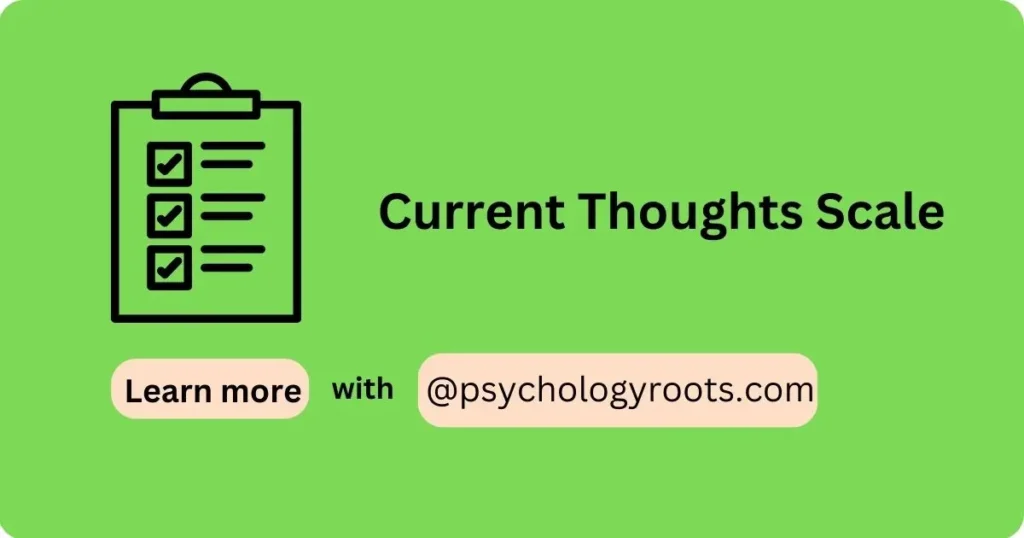Table of Contents
Current Thoughts Scale
Here in this post, we are sharing the “Current Thoughts Scale”. You can read psychometric and Author information. We have thousands of Scales and questionnaires in our collection (See Scales and Questionnaires). You can demand us any scale and questionnaires related to psychology through our community, and we will provide you with a short time. Keep visiting Psychology Roots.
About Scale Name
Scale Name
Current Thoughts Scale
Author Details
Heatherton & Polivy
Translation Availability
Not Sure

Background/Description
In the article by Heatherton and Polivy (1991) on the development and validation of a scale for measuring state self-esteem, the “Current Thoughts Scale” refers to one component of the State Self-Esteem Scale (SSES) that was developed in their study. The SSES is a comprehensive questionnaire designed to measure an individual’s momentary or situational feelings of self-worth.
The Current Thoughts Scale, as a part of the SSES, likely consists of a subset of items within the larger scale that assesses an individual’s current thoughts and feelings about themselves at a given moment. These items may cover various dimensions related to self-esteem, such as feelings of worthiness, competence, likability, or acceptance.
The specific items and scoring for the Current Thoughts Scale within the SSES would be detailed in the original article by Heatherton and Polivy (1991). They would provide more specific information on how the scale was constructed and validated, as well as its psychometric properties and interpretation.
The first step in the development of a state self-esteem measure was to obtain suitable questions. We decided to examine popular trait measures to see whether any of them might be suitable for conversion to state measures. We settled on two scales: the Rosenberg Self-Esteem Scale (RSE; Rosenberg, 1965, 1979) and the JFS (Janis & Field, 1959).
Administration, Scoring and Interpretation
Introduction: Begin by explaining the purpose of the scale and ensuring that participants understand the concept of Current Thoughts Scale. Provide clear instructions for rating their experiences.
Specify the time frame: Determine the specific time period for which participants should recall and rate their experiences. Common options include the past week, month, or year. Clearly communicate the timeframe to participants.
Reliability and Validity
N/A
Available Versions
20-Items
Reference
Heatherton, T.F. & Polivy, J. (1991). Development and validation of a scale for measuring state self-esteem. Journal of Personality and Social Psychology, 60, 895-910.
Important Link
Scale File:
Frequently Asked Questions
What is the Current Thoughts Scale?
A: The Current Thoughts Scale is a component of the State Self-Esteem Scale (SSES) developed by Heatherton and Polivy in their 1991 study. It assesses an individual’s momentary or situational feelings of self-worth.
What is the purpose of the Current Thoughts Scale?
A: The Current Thoughts Scale aims to measure an individual’s current thoughts and feelings about themselves at a given moment, specifically related to self-esteem.
How many items are included in the Current Thoughts Scale?
A: The Current Thoughts Scale consists of 20 items that assess various dimensions related to self-esteem, such as worthiness, competence, likability, or acceptance.
Disclaimer
Please note that Psychology Roots does not have the right to grant permission for the use of any psychological scales or assessments listed on its website. To use any scale or assessment, you must obtain permission directly from the author or translator of the tool. Psychology Roots provides information about various tools and their administration procedures, but it is your responsibility to obtain proper permissions before using any scale or assessment. If you need further information about an author’s contact details, please submit a query to the Psychology Roots team.
Help Us Improve This Article
Have you discovered an inaccuracy? We put out great effort to give accurate and scientifically trustworthy information to our readers. Please notify us if you discover any typographical or grammatical errors.
Make a comment. We acknowledge and appreciate your efforts.
If you have any scale or any material related to psychology kindly share it with us at psychologyroots@gmail.com. We help others on behalf of you.